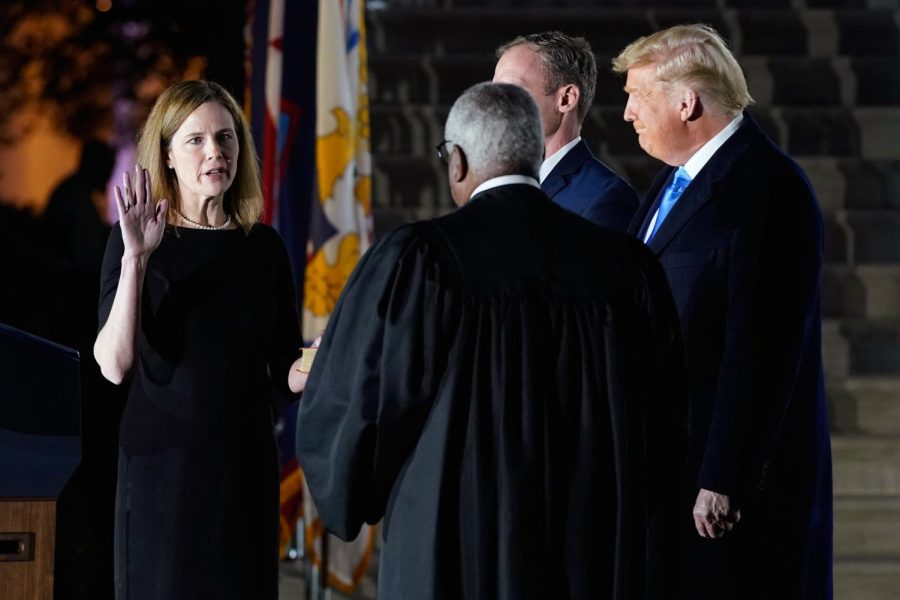Why Amy Coney Barrett’s Appointment to the Supreme Court Matters
Amy Coney Barrett was sworn in by Justice Clarence Thomas, the longest tenured justice on the court.
October 30, 2020
On Monday, October 26, in an evening vote, the Senate confirmed Amy Coney Barrett’s nomination to the Supreme Court. While the conservative justice’s ascension to the court was met with both excitement and angst, there is no doubt that she will play an important role moving forward.
Coney Barrett’s confirmation comes only a month and a half since the death of her predecessor, Justice Ruth Bader Ginsburg, who passed away in September. After the confirmation vote, Coney Barrett was promptly sworn in by fellow Justice Clarence Thomas, thus filling the ninth seat on the court.
With rising COVID numbers across the country, strong calls for social justice, and the upcoming presidential election, the nation’s political climate has been both tense and revitalized as votes roll in across the country. Nevertheless, Coney Barrett’s nomination and now confirmation to the nation’s highest court has left many people in an upheaval and anxious about the future of several key laws. Some are thrilled about the packing of the court with a conservative majority as six of the nine justices are seen as conservative thinkers, while others are worried about what this means for previous rulings and the future of the country.
On one hand, Coney Barrett’s confirmation is a win for the current administration. In what can only be described as a lightning quick nomination and confirmation for the South Bend, Indiana judge, President Trump has now appointed three justices to the Supreme Court in less than four years. As a Republican president, his choice of Coney Barrett, just as his choices of Brett Kavanaugh in 2018 and Neil Gorsuch in 2017, has pushed the court further to the far right. This six to three imbalance gives a likely glimpse into how the Supreme Court will rule in future cases
Many fear that this conservative majority might manifest in landmark cases that is likely to push the country into a more conservative state. This includes reversing decisions that proved monumental for many Americans, particularly the right to same-sex marriage, which was decided in Obergefell v. Hodges in 2015, and nationwide access for abortions, which came to be known as Roe v. Wade in 1973. Changing these decisions could result in the nation taking a serious step backwards in many people’s eyes.
On the other hand, Coney Barrett’s confirmation comes at a time where doubt and distrust toward this year’s presidential election are on the rise. Due to the pandemic and realities of social distancing, voting has been moved to mail-in or drop-off ballots; and voting in person often means long lines that can take hours. Although millions of citizens have already mailed in their decisions or voted early, there is fear about whether the results will be accurate. This has rekindled fears from the presidential election of 2000, which is remembered for its dispute over vote counts in Florida. In 2000, the race between Texas Governor George W. Bush and Vice-President Al Gore ended up in the hands of the Supreme Court, which ruled that Bush had, indeed, won Florida. The president has appointed one third of the Court, and with this in mind, the 2020 election appears to be one that may be decided by an entity that is, in large part, associated with one of the candidates.













































